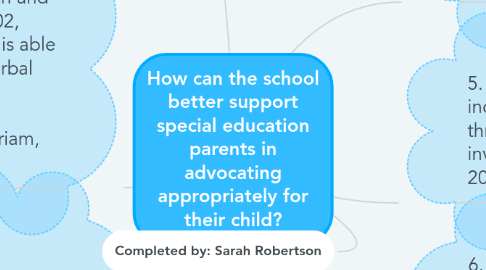How can the school better support special education parents in advocating appropriately for their child?
by Sarah Robertson

1. 3. The process is inductive. “Researchers gather data to build concepts, hypotheses, or theories rather than deductively deriving postulates or hypotheses to be tested” (Merriam, 2002, p.4-5).
1.1. Application: I plan to conduct my interview in a small group setting. This will likely lead to the comments of one participant prompting comments from another participant. This will help the conversation flow naturally rather than me anticipating what the interviewees will say and then asking them questions based on my assumptions.
2. 1. “Researchers strive to understand the meaning people have constructed about their world and their experiences; that is, how do people make sense of their experience?” (Merriam, 2002, p.4-5).
2.1. Application: While all of my participants are special education teachers, they will vary in terms of race, background, age, and gender. This will help me gain a broader understanding of how the school can better support special education parents in advocating for their child.
3. 2. “The researcher is the primary instrument for data collection and data analysis” (Merriam, 2002, p.5). The human instrument is able to be responsive, use nonverbal communication, check for interpretation, and explore unexpected responses (Merriam, 2002).
3.1. Application: All of my data will be collected in a face-to-face focus group. During the focus group, I will be able to ask follow up questions in order to check understand. Participants will be able to confirm or deny if their experiences are similar to each other.
4. Completed by: Sarah Robertson
5. 4. “The product of a qualitative inquiry is richly descriptive. Words and pictures rather than numbers are used to convey what the researcher has learned about a phenomenon” (Merriam, 2002, p.4-5).
5.1. Application: Parts of the interview will be transcribed verbatim. This will help provide rich and detailed descriptions and quotations.
6. 5. Qualitative researchers are inclined to interpret their research through the eyes of the people involved in the study (Bryman, 2004).
6.1. Application: I plan to keep questions fairly vague and open-ended so that participants are able to answer in their own words and bring their own perspective to the situation.
7. 6. Qualitative research is characterized as being flexible and having limited structure. The idea is to let the research take you on a particular path and not to have a predetermined expectation of what is going to occur (Bryman, 2004).
7.1. Application: I plan to have a list of interview questions to pull from, but not in a specific order. The questions will help prompt conversation, but will not serve as the "end all, be all" for the interview.


